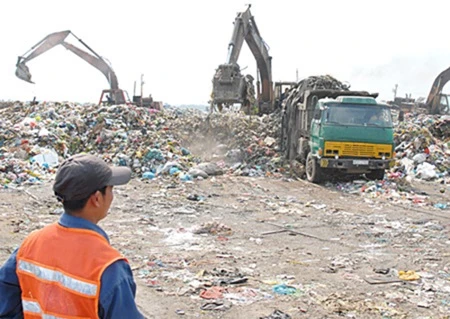The 13th ASEAN Ministerial Meeting on the Environment (AMME 13), the 14th ASEAN+3 Ministerial Meeting on the Environment and related events commenced in Hanoi on October 28.
The AMME 13’s related meetings – including a preparatory senior officials’ meeting, the 14th ASEAN+3 ministerial meeting, the 11th meeting of the committee on implementing the ASEAN Agreement on Trans-boundary Haze Pollution and the 11th meeting of the parties to this treaty – kicked off on October 26 and will last through October 30.
The events are being attended by the environmental ministers of the 10 ASEAN nations and the partner countries (China, Japan and the Republic of Korea) as well as the ASEAN Secretariat.
The AMME 13, rotated triennially among the ASEAN countries, is scheduled to review the realisation of regional environment-related agreements since the AMME 12, discuss new scopes of environmental cooperation and propose solutions to foster ASEAN collaboration in environmental matters, especially for the post-2015 period after the ASEAN Community is formed.
Participants will also consider and approve an ASEAN declaration on climate change in preparation for the upcoming conference of the parties to the 2015 United Nations Framework Convention on Climate Change (COP 21) in Paris this December.
At the opening ceremony, Prime Minister Nguyen Tan Dung said in joining global efforts, the 10 ASEAN member nations have continually attached importance to environmental protection, biodiversity preservation and sustainable use and management of natural resources serving socio-economic development targets.
He stressed that ASEAN has reaped approving outcomes in environmental protection cooperation, including completing the implementation of actions to ensure environmental sustainability under the ASEAN Socio-Cultural Community Blueprint 2009-2015.
The bloc’s cooperation in environmental protection with its partners like the European Union and those in the frameworks of ASEAN+1, ASEAN+3 and the East Asia Summit has been unceasingly reinforced. ASEAN has also actively engaged in the UN Framework Convention on Climate Change and issued joint statements on climate change, the leader added.
Although many ASEAN countries, including Vietnam, are not major greenhouse gas emitters, they have been seriously affected by climate change. Climate change, environmental pollution and food and water resource security have become major regional and global problems which cannot be resolved by a single country; only through joint efforts of the entire international community, he emphasised.
PM Nguyen Tan Dung said the heavy mission tasked to all nations is to develop the economy and protect the environment simultaneously; he asked all countries to consider environmental protection as both a target and a fundamental matter of sustainable development.
With regards to Vietnam specifically, it is facing enormous environmental-related challenges despite endeavours and initial attainments in environmental protection, he noted, citing foreign experts as saying that if Vietnam lacks adequate attention to environmental protection, every 1 percent GDP growth rate could cause environmental damages equivalent to 3 percent of the GDP in the next 10 years.
He expressed his hope for further cooperation and support to Vietnam in the issue, stating the nation is also willing to work with other ASEAN members, partner countries and the international community to protect the regional and global environment.
The Vietnamese Government leader said he believes the AMME 13 and ASEAN+3 ministerial meeting will work out concrete cooperation programmes to ensure environmental sustainability and climate change response, contributing to the success of the COP 21 as well as the UN’s 2030 Agenda for Sustainable Development.-VNA
























